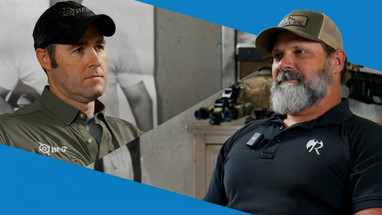Mar 5th 2025
BETWEEN 2 TARGETS™
Former SWAT Officer Jared Reston Shares Life-Changing Experience
Always Better® | March 6th, 2025
In this video Chris Sizelove and Jared Reston sit down for a conversation about gunfighting, mindset, and winning. Jared is a seasoned law enforcement veteran with over 20 years of service at Jacksonville Sheriff's Office. Since retiring in 2020, he now travels the nation teaching firearms and tactics to prepared citizens, military personnel, and law enforcement agencies.
Jared's perspective was forever altered in 2008 during what began as a routine shoplifter pursuit at Jacksonville's Regency Square Mall. The confrontation turned deadly when the suspect produced a Glock 21 and shot Jared seven times. Despite taking rounds to his jaw, body armor, thigh, and other areas, Jared maintained his composure and returned fire effectively, neutralizing the threat. This watershed moment has radically impacted Jared’s life and inspired him to share training techniques with others through his training company, Reston Group Training.
Since this event, Jared has been an advocate for mindset. His training philosophy is clear: the goal in a lethal confrontation isn't merely to survive—it's to win. "I hate the term surviving," he explains. "To me, survival is what you do if you crash your car in the woods and drink your pee and eat berries... a gunfight is a high-stakes game, and games have to have a winner."
The conversation delves into the importance of shot placement and the resilience of the human body during traumatic injuries. Jared notes that while the human body is a large target, the areas that will immediately stop a threat are surprisingly small. Disrupting brain or heart function is about the only way to neutralize a threat.
Chris and Jared agree that proper mindset, weapon manipulation skills, and marksmanship are critical components in prevailing in armed confrontations. The function of training is to make fundamental skills so automatic that your mental bandwidth can be dedicated entirely to solving the immediate problem rather than worrying about manipulating your weapon.
Reston Group Training offers numerous open enrollment classes for civilians and professionals. Jared can also be found in New Hampshire at Ridgeline Defense, which he describes as "the Disney World of the shooting realm." Even though Ridgeline is known for precision long-range shooting they now offer a wide variety of training including CQB.
For more information on Jared, visit his website.
Watch The Video Now
About Chris Sizelove
Chris Sizelove is a retired Master Sergeant who had a distinguished career in the U.S. Army. Joining in 1999, he served in various capacities in the elite 75th Ranger Regiment spanning across the 2nd, 3rd, and 1st Battalions. His extensive service includes roles as a Pre-Ranger Instructor and a pivotal participant in forming the Regimental Special Troops Battalion (RSTB). Sizelove also held the elite position of Master Breacher of the Regiment and later transitioned to roles in the Defense Intelligence Agency.
About Blue Force Gear®
BFG, headquartered in Pooler, Georgia, has been a trusted name in professional-grade gear and accessories for two decades. Their commitment to excellence, innovative designs, and use of premium materials have made them a favorite among military, law enforcement, and recreational shooters worldwide.
Press Contact
PR Contact: Marketing@blueforcegear.com
Sales and Dealer Contact: Sales@blueforcegear.com

